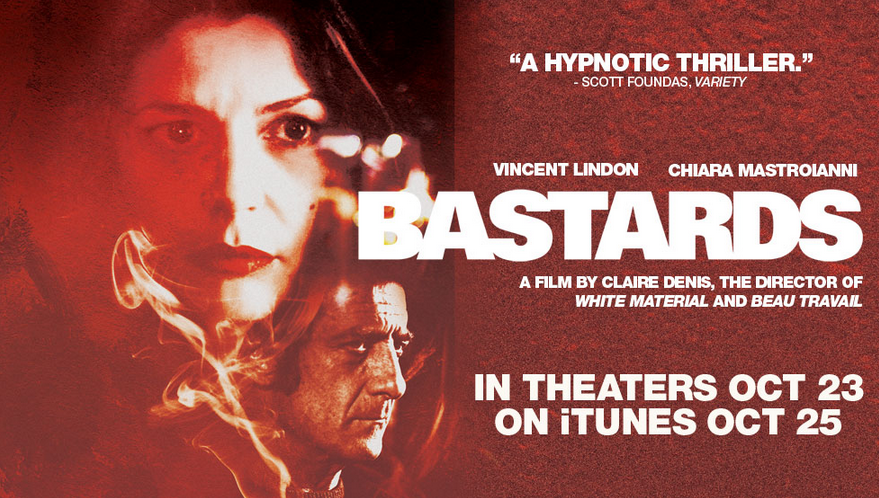Rio 2096 - A Story of Love and Fury (Luiz Bolognesi, Brazil, 2013)
I'm impressed at how this film got made, how it got funding. Because, boy, is this an angry film. Four stories about Brazil, three from the past, one from the future. I get why it's animated, because a live-action version of this film would have been so immensely epic and expensive, that all the critique would undoubtedly have been removed.
Still, I'm impressed by the fury of this film. Granted, Brazilian history invites itself to this kind of fury. We follow an immortal warrior named Abeguar through four time periods, where he is constantly battling for the underdog, and always in love with a new woman named Janaína. He is an Indian fighting the Portuguese, a Mestizo leading an uprising against the Empire of Brazil, a student fighting the dictatorship, and finally, joining a group of terrorists in the future fighting a water-conglomerate for the right to water for everyone. We watch people being massacred and tortured, bodies being roasted and eaten, children getting raped and shot. It's all a bit much. But I don't think it's superfluous or that ahistorical. The indians were almost wiped out. The rebellion is based on the Balaida-rebellion - named because on of the main instigators made baskets or 'balaios', like the warrior in the film - which was crushed like so many other internal rebellions by Luís Alves de Lima e Silva, nicknamed both The Iron Duke and The Peacemaker. The segment set under the dictatorship is twofold, first when Abeguar fights along with other bourgoise students, and then after he is released from jail with him moving into the favelas to fight with the poor. The theme of the need to fight against opression is stated more nuanced than it often is. Because they always fight, and they always lose, and they take bystanders down with them. After being released from jail, the students, including Janaína, manage to go back into a middleclass life, while the poor become even more left out and hidden in the favelas. The sci-fi part suffers from what so many sci-fi's suffer from in being less clever than it seems to think it is - I guess it's mainly about the importance of keeping natural resources under control by the people. Like Petrobras.
So the fury is all well and good. But the part about love is a bit pat. At times, it mainly seems like Abeguar loves Janaínia because of her name, and because she whistles so prettily at him when he is disguised as a bird. Of the four stories, only the fourth really revolve around love as a major part. Here Abeguar has sorta given up, and is happy to buy the love from Janaína, who now is a high-class prostiture, I guess. But once she makes her move against the regime, he changes his mind. I like that it switches the gendered view of who is a fighter and who is fought for at the end. Also, the animation isn't really that impressive. The future society is impressively designed, but there is a dearth of really well-designed pictures, and the movements are mainly choppy. And really, I've seen reviewers talk up the amount of violence and sex in this cartoon, and while it's unusual for a cartoon, that it's all animated does serve to lessen the impact of it all. It's violent for an animated film, but for a violent film, it's pretty easy to sit through. And I'm not sure if that was the point. The film seems to want to be a call for action, but I'm uncertain if it works like that. It's a fine primer on Brazilian history, though, which I'd recommend diving into since we're all going to hear a lot about the country once the World Cup begins.
Still, I'm impressed by the fury of this film. Granted, Brazilian history invites itself to this kind of fury. We follow an immortal warrior named Abeguar through four time periods, where he is constantly battling for the underdog, and always in love with a new woman named Janaína. He is an Indian fighting the Portuguese, a Mestizo leading an uprising against the Empire of Brazil, a student fighting the dictatorship, and finally, joining a group of terrorists in the future fighting a water-conglomerate for the right to water for everyone. We watch people being massacred and tortured, bodies being roasted and eaten, children getting raped and shot. It's all a bit much. But I don't think it's superfluous or that ahistorical. The indians were almost wiped out. The rebellion is based on the Balaida-rebellion - named because on of the main instigators made baskets or 'balaios', like the warrior in the film - which was crushed like so many other internal rebellions by Luís Alves de Lima e Silva, nicknamed both The Iron Duke and The Peacemaker. The segment set under the dictatorship is twofold, first when Abeguar fights along with other bourgoise students, and then after he is released from jail with him moving into the favelas to fight with the poor. The theme of the need to fight against opression is stated more nuanced than it often is. Because they always fight, and they always lose, and they take bystanders down with them. After being released from jail, the students, including Janaína, manage to go back into a middleclass life, while the poor become even more left out and hidden in the favelas. The sci-fi part suffers from what so many sci-fi's suffer from in being less clever than it seems to think it is - I guess it's mainly about the importance of keeping natural resources under control by the people. Like Petrobras.
So the fury is all well and good. But the part about love is a bit pat. At times, it mainly seems like Abeguar loves Janaínia because of her name, and because she whistles so prettily at him when he is disguised as a bird. Of the four stories, only the fourth really revolve around love as a major part. Here Abeguar has sorta given up, and is happy to buy the love from Janaína, who now is a high-class prostiture, I guess. But once she makes her move against the regime, he changes his mind. I like that it switches the gendered view of who is a fighter and who is fought for at the end. Also, the animation isn't really that impressive. The future society is impressively designed, but there is a dearth of really well-designed pictures, and the movements are mainly choppy. And really, I've seen reviewers talk up the amount of violence and sex in this cartoon, and while it's unusual for a cartoon, that it's all animated does serve to lessen the impact of it all. It's violent for an animated film, but for a violent film, it's pretty easy to sit through. And I'm not sure if that was the point. The film seems to want to be a call for action, but I'm uncertain if it works like that. It's a fine primer on Brazilian history, though, which I'd recommend diving into since we're all going to hear a lot about the country once the World Cup begins.
Rio Belongs to Us (Ricardo Pretti, Brazil, 2013)
After having been so pleasantly surprised by Road to Ythaca, I checked the program and found out that there was a showing of another film by one of the four directors. They're all part of a group called Alumbramento, who helps each other with making films, in an underground and independent fashion. This has really been my big surprise this festival, far from being the best films, but these two films had a sense of independence, of willing to be different, and an energy to them, which was quite frankly refreshing. I've liked most of what I've seen, but there is a sort of sameness to a lot of second-tier arthouse filmmaking, a European inspired tasteful aesthetic with long takes, but not too long, diffuse plots, but not too diffuse, pretty pictures, etc. This still had long takes, a diffuse plot and some quite pretty pictures, but it left the world of tastefulness far behind in favour of cheap and brassy pretentiousness.
Oh yes, this was pretentious as hell. I think most of the theater was annoyed at that, and quite frankly, if I'd payed full price for the ticket, I'd might have been as well. But I really liked it. We begin with a black screen and clanging noises, then cut to two naked people in a post-coital embrace. Hold it a long time. Part of the film was in English for no apparant reason, and the toneless and weird delivery makes me think the actors didn't really understand what they were saying. Most of the film took place in empty rooms, mainly filled by matresses and naked lightbulbs. The barebones plot has Marina receiving some very weird messages saying 'Rio Belongs to Us', but mainly the film was a moodpiece, a collection of dreams and weird dialogues.
Oh yes, this was pretentious as hell. I think most of the theater was annoyed at that, and quite frankly, if I'd payed full price for the ticket, I'd might have been as well. But I really liked it. We begin with a black screen and clanging noises, then cut to two naked people in a post-coital embrace. Hold it a long time. Part of the film was in English for no apparant reason, and the toneless and weird delivery makes me think the actors didn't really understand what they were saying. Most of the film took place in empty rooms, mainly filled by matresses and naked lightbulbs. The barebones plot has Marina receiving some very weird messages saying 'Rio Belongs to Us', but mainly the film was a moodpiece, a collection of dreams and weird dialogues.
And I liked it a lot. It drew a lot on horror, with the weird messages and all the empty rooms. There is even a scene where Marina walks on a beach in the weird and unnerving way like the ghost from The Ring. It was quite effective at that. But mostly, I loved the space it created. All those empty rooms. In one scene Marina is in a darkened room, and removes taped-up newspaper from a window, all of a sudden creating a portal to the world outside. The film showed Rio de Janeiro in a way I've never seen it before, showing empty concrete high-rises against the treefilled mountains surrounding it, and focusing quite a lot on the river. It felt as if nature was collapsing in on the city, as if it was a concrete maze fenced in by rock, water, tree and cloudfilled sky. I've never been to Rio de Janeiro, but I'm pretty certain that is not what the city is like. However, that is one of the great thing about cinema, the way a filmmaker can turn his surroundings into a personal vision. And the city of Rio Belongs to Us was one of the best cities I'd seen at the festival.
Tom at the Farm (Xavier Dolan, 2013, Canada)
Xavier Dolan is the wunderkind of arthouse cinema. 25 years old, and his fifth feature has just been chosen for competition at Cannes. This one, his fourth, was at Venice, where it won the FIPRESCI prize. Also, he's a famous voice-actor in Quebec, haven't dubbed roles such as Ron Weasley, Brainy Smurf and Jacob from Twilight. I guess we might very well be stuck with him for a looong time, so though I don't think his films seem that interesting, I decided to check this out. And I don't get it. It isn't bad, not at all. Well made, beautiful, tense and suspenseful. But also a bit dull, and not really amounting to much.
The film is an adaptation of a play with the same name. It follows Tom as he travels to a farm for the funeral for his lover Guillaume. Guillaume's brother Francis forces him to keep it a secret that Guillaume was gay, and then it all becomes fucked up and thriller-like. There was a lot of stuff I liked: An impromptu tango-dance, an ominous shot of a dead cow being dragged behind a tractor, a scene where Tom comes running out of the stable with blood on his hand, and we think he has taken part in a slaughter of a cow, but then learns he helped a cow give birth instead. And Dolan captures the northen lights with the long shadows quite well. The first few times we see Francis, his face is hidden from us as well as Tom, and when he then violently wakes Tom up, there's a scary short shot of his head without a face on it. The film is filled with good details like that. It's the main story I don't care for.
The film is sort of a psychological thriller, but both the thriller-aspects and the psychology is a bit rubbish. Francis is shunned by the surrounding society, what horrible thing did he do? The answer migth bore you, or you might figure the gist of it out pretty early on. And what makes Francis tick, why is he like he is? Again, while it isn't explicitly stated, there are enough clues that point in a pretty boring direction. The psychology of Tom actually seems a bigger mystery to me, why on Earth does he act like he does? There is a twist concerning him I didn't see coming, and I wouldn't have guessed it in a thousand years. Because it doesn't make any sense at all, psychologically.
Also, the music. This film had one of the worst scores I heard at the festival. So boring, so intruding, so annoying. Apparantly, Dolan had considered no score, and just having the sound of leaves and wood creaking. Yeah, that would have improved the film immensely. Wouldn't have made it great, but I'd been less annoyed by it. All in all: Fine, nothing more. If this is the best he has made, then I don't get what he is doing at Cannes at all.
And that concludes my reviews from this year of PIX. 38 films. Check out the archive, by clicking on PIX14. Hope you might find something that interests you.










